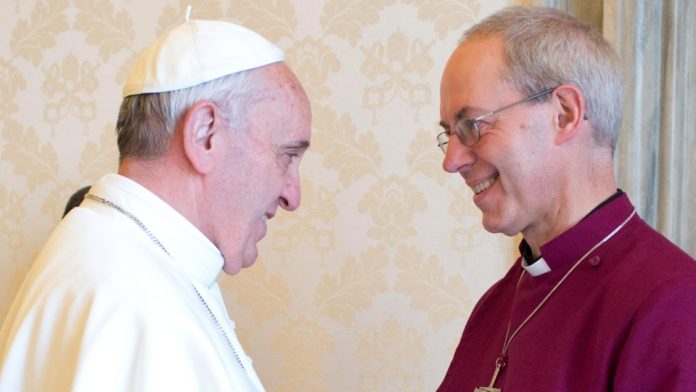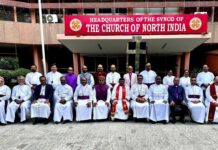“Since we began our respective ministries within days of each other, I think we will always have a particular reason to support one another in prayer.” So said Pope Francis to the archbishop of Canterbury, Justin Welby, at the Vatican in June 2013. Perhaps providence did indeed have a hand in two prominent Christian leaders beginning their new ministries with such proximate timing. It certainly seemed, over the past decade, that there was a rapport between the two men that went far beyond dutiful ecumenism. (The archbishop resigned on Nov. 12 in response to an independent review that found he had failed to respond adequately to disclosures of sexual abuse at church-run camps in the 1970s and 1980s.)
The relationship between Pope Francis and Archbishop Welby was marked by a shared delight in stretching ecumenical convention. This year’s Week of Prayer for Christian Unity offered a fascinating example. Visiting Rome in January, the archbishop thanked the pope for permission to celebrate an Anglican Eucharist liturgy at the Catholic Basilica of St. Bartholomew. Several Catholic commentators more than raised an eyebrow at this permission, but the prefect for the Dicastery for Promoting Christian Unity, Cardinal Kurt Koch, called the service a gesture of “fraternity with this church so close to ours.”
In May, that fraternity was expressed in a different way, this time with the pope spending considerable time with the international Anglican leaders (known as primates) who had gathered for a meeting with the archbishop of Canterbury, again in Rome. The irony of this particular event was that, with regard to Anglican-Catholic relations, it represented an unprecedented expression of unity, but the actual number of Anglican primates present was severely reduced because of internal Anglican tensions over sexuality and a repudiation of the archbishop’s leadership.
Archbishop Welby chose to focus on the ecumenical dimension to the meeting, calling it “a moment in history where we have seen the closeness of our relationship with Rome at the pastoral, the missional and the spiritual level, which demonstrates the progress made over the last half century from real antipathy, to deep bonds of friendship all round the world.”
This international dimension to Anglican-Catholic relations was most powerfully expressed early last year, when the pope, the archbishop and (for good ecumenical measure) the moderator of the General Assembly of the Church of Scotland traveled together to South Sudan for an “ecumenical pilgrimage of peace.” As the BBC reported at the time: “There has never been a visit like it and it has been years in the planning.”
After many memorable occasions in the country, drawing together tens of thousands of worshipers, the archbishop gifted the pope an award known as the Lambeth Cross for Ecumenism. He said that Francis had “given new impetus to Catholic ecumenical work, and breathed into it a true ‘ecumenism of the heart.’”
These events have been rich in symbolism but undergirded by the clear friendship and camaraderie of the two men. I suspect it will be poignant for them both to reflect on the ecumenical journey they have traveled together, now that it has been brought to an abrupt conclusion.
I was struck by the prominence with which the Vatican website covered the archbishop’s resignation, stating that it came about because “he had failed to ensure there was a proper investigation into allegations of abuse.” It was afforded a degree of coverage that reflected the depth of relationship that has been expressed in recent years.
It is self-evident that Archbishop Welby’s resignation has rocked the Church of England and sent reverberations through the wider Anglican Communion. But perhaps for Catholics and other Christian denominations, there are also potential implications worth noting. If the leader at the apex of the pyramid is willing to resign, largely because of institutional failure rather than personal mistakes, what kind of precedent might this set?
Before my own Anglican ordination, I was a BBC correspondent covering religion. One of my very first filming assignments, as a junior television news producer, involved a trip to the United States to cover the U.S. Conference of Catholic Bishops’ audit of sex abuse cases, the John Jay report, published in 2004. We visited large seminaries virtually empty of priests and abandoned derelict buildings once owned by religious communities. The stories of abuse that we heard were shocking and often sinister.
Shamefully, I remember thinking that this was a “Catholic problem,” largely associated with the demands of priestly celibacy. But as recent years have shown, it turned out there were plenty of dark truths waiting to be exposed in Anglican contexts, too.
Read it all in America Magazine










